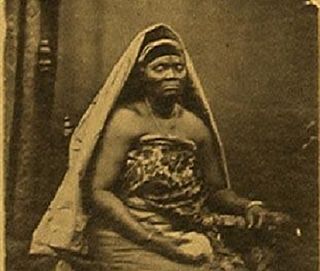Omoba Sir Adetokunbo Adegboyega Ademola, KBE, GCON, PC, SAN was a Nigerian jurist who was the Chief Justice of the Supreme Court of Nigeria from 1958 to 1972. He was appointed as Chief Justice on April 1, 1958, replacing Sir Stafford Foster Sutton who was retiring. Ademola was a son of Oba Sir Ladapo Ademola II, the Alake of the Egba clan of Nigeria. He was the first chancellor of the University of Benin.

Madam Efunroye Tinubu, born Efunporoye Osuntinubu, was a politically significant figure in Nigerian history because of her role as a powerful female aristocrat and slave trader in pre-colonial and colonial Nigeria. She was a major figure in Lagos during the reigns of Obas Adele, Oluwole, Akitoye, and Dosunmu.

Chief Funmilayo Ransome-Kuti, MON, otherwise known as Funmilayo Anikulapo-Kuti, was a teacher, political campaigner, women's rights activist and traditional aristocrat in Nigeria. She served with distinction as one of the most prominent leaders of her generation. She was also the first woman in the country to drive a car. Born as Francis Abigail Olufunmilayo Thomas, she was the first female student at the Abeokuta Grammar School, which she attended from 1914 to 1917. Ransome-Kuti's political activism led to her being described as the doyenne of female rights in Nigeria, as well as to her being regarded as "The Mother of Africa." Early on, she was a very powerful force advocating for the Nigerian woman's right to vote. She was described in 1947, by the West African Pilot, as the "Lioness of Lisabi" for her leadership of the women of the Egba people on a campaign against their arbitrary taxation. That struggle led to the abdication of the high king Oba Ademola II in 1949.
Anastasios George Leventis was a Greek Cypriot businessman who founded a major merchandise trading firm, A.G. Leventis (Nigeria) Plc, in West Africa. A dominant figure in the economy of many West African countries and especially Nigeria, he was awarded the title of Babalaje of Egbaland by Alake Ladapo Ademola. The Egba Scholarship Scheme popularly known as "A.G. Leventis (Egba) Scholarship Scheme" which award study funds to both undergraduate and postgraduate students of Abeokuta and Egbaland in general was coined after his name and it still exist till date.
Oba means ruler in the Yoruba and Bini languages of West Africa. Kings in Yorubaland, a region which is in the modern republics of Benin, Nigeria and Togo, make use of it as a pre-nominal honorific. Examples of Yoruba bearers include Oba Adeyemi of Oyo, Oba Ogunwusi of Ile-Ife and Oba Akiolu of Lagos. An example of a Bini bearer is Oba Ewuare II of Benin.

Oloye Sir Adeyemo Alakija, KBE was a Nigerian lawyer, politician and businessman. He served as a member of the Nigerian legislative council for nine years starting in 1933. In 1942, he became a member of the governor's Executive Council. Alakija was president of Egbe Omo Oduduwa from 1948 until his death in 1952.

Ijoko is a town in Ifo local government, Ogun State, Western Nigeria, located north of Lagos and south of Abeokuta.
The Olowu of Owu is the paramount Yoruba king of Owu kingdom. The first Olowu of Owu is also one of the original kings in Yoruba kingdom.
The ethnic people of Owu (Owus) are part of the Yoruba people of West Africa. Ago-Owu in Abeokuta is where the Owus are mostly concentrated, however large Owu settlements are found throughout the Yoruba kingdom. The Yoruba kingdom extends beyond the boundaries of Nigeria into the Republic of Benin.

Gbalefa Peninsula is an area of land located south of Abeokuta and north of Lagos city. Gbalefa Peninsula was named after Akindele Gbalefa, the outstanding Owu warrior who led the Owu/Egba war against Ilobi, Ado-Odo and Dahomey.

Egba Alake is one of the five sections of Egbaland, the others being Oke-Ona, Gbagura, the Owu and Ibara. It is a traditional state which joins with its bordering sections to form something of a high kingship. The Alake of Abeokuta, or Alake of Egbaland, is the traditional ruler of the Egba clan of Yoruba in the city of Abeokuta in southwestern Nigeria.
Ago-Oba is electoral ward 13 in the city of Abeokuta, Ogun State, Nigeria. It is part of the Abeokuta South Local Government Area.
Adegboyega Dosunmu Amororo II (CON is the traditional ruler of Owu kingdom, Ogun State, Nigeria with the appellations of Olowu of Owu Kingdom. He succeeded Oba Olawale Adisa Odeleye, Lagbedu 1 who died on June 2003 at the age of 65 years.
Eso Ikoyi is an aristocratic attribute amongst the Yoruba people which denotes an eminent warrior. It has been used as everything from a chieftaincy title to a part of praise poetry.

Iju also known as Iju Oloko [idʒou ɔ:lɔkɔ], is a Nigerian town located in southern Ogun state and about 18 kilometers from Lagos state, a major commercial hub in West Africa. The town is inhabited mostly by Owu and Egba natives whose ancestors settled there between 1842 and 1845.
Oba Samuel Adesina Gbadebo sometimes known as Gbadebo II was a Nigerian traditional monarch who held the title of Alake of Egbaland. Prior to becoming Alake, Gbadebo organized agricultural shows in the Western region.






